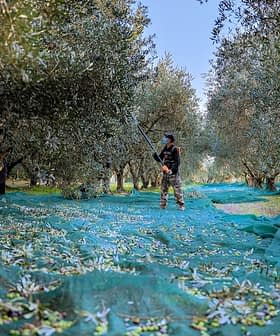Labeling Practices Still Not Up to Par in France, Report Finds
The French Directorate-General for Competition, Consumer Affairs and Fraud Control's recent report finds that misleading marketing information surrounding the sale of olive oil and related products still requires further regulation.
The French Directorate-General for Competition, Consumer Affairs and Fraud Control (DGCCRF) has released its findings from a study of olive oil quality conducted “as part of its annual control plan conducted in 2016,” according to a report published on the organization’s website.
The DGCCRF asserts that the control plan is part of a larger mission to monitor product safety and foster the economic protection of the consumer. The results proved less than promising, with 67, or 48 percent, of the 139 samples collected failing to meet current standards.
This recent study stems from ongoing efforts made by the European Union to effectively establish appropriate marketing standards for olive oil and other products that incorporate it into their compositions.
Regulation (EU) Number 29/2012, passed on January 13, 2012, explains that the distinct sensory and nutritional traits presented in olive oil render it unique among other vegetable fats. The document explains that because agricultural practices vary throughout different regions, “qualities and tastes [are] remarkably different according to their geographical origins.” This ultimately results in “price differences within the same oil category that disrupt the market.” Such distinctions differentiate olive oil from other vegetable products, which vary less according to their country of origin.
The DGCCRF’s report follows its 2015 olive oil control plan, whose results were published in 2017. At that time, it was noted that adverse weather conditions, the prevalence of the olive fly and the pathogen Xylella fastidiosa had increased the commodity’s price, and that “this price pressure, which increases competition, is the cause of frequent fraud that results in high rates of non-compliance.” That report noted that 41 percent of tested products did not comply with regulations.
The 2018 report states that “most of the deficiencies observed by investigators relate to product labeling.” Labeling discrepancies found by the DGCCRF are essentially classified into disputes of organoleptic traits or “non-compliance with physiochemical parameters.” While analyses did find some misleading labeling relating to sensory descriptions, the report focuses on incorrect marketing information related to the “absence of an indication of the origin,” and a “lack of obligatory mentions of net volume and the category of oil.”
Several specific areas of concern made themselves evident throughout the study and could aid in the modification of standardized labeling practices. Strikingly, the DGCCRF determined that “the rate of non-compliance” for offending products was “higher when the indication of origin is not precise and when the oil comes from countries with the largest volume of production.”
Other offenses were found, including “a company that marketed in the food circuit an olive oil classified lampante by the laboratory” and another that sold products “under the name ‘extra virgin olive oil,’ while analysis revealed that it was a mixture of vegetable oils.” In total, this round of testing resulted in 71 warnings, 39 injunctions, and 3 “prefectural decrees of destruction.”
The proportion of products displaying anomalies grew from 41 to 48 percent since the DGCCRF published its last report of this kind. However, this recent edition states that “the rate of non-compliance found during the controls is not representative of the reality of the market since the controls are ‘targeted’ according to the information available to the investigators.”
It still stands to be seen whether the insights gained through the investigations will translate into appropriate measures that can effectively stymie future transgressions.








